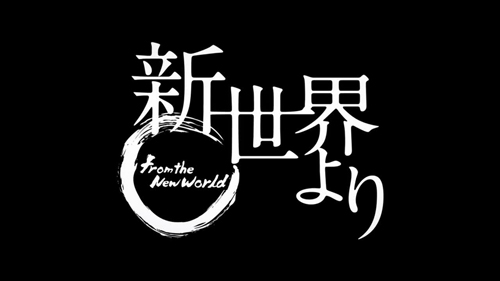
(Note: This review is spoiler-free and only contains a few small details about the plot)
Along with watching about 12 new shows from Spring 2013, I am slowly going through a bunch of stuff I missed last year. After watching (and loving) Zetsuen no Tempest, I went against my own instincts and popped on Shin Sekai Yori (From the New World). Smart decision.
Produced by A-1 and currently streaming on Crunchyroll, Shin Sekai Yori is based on the novel by Yusuke Kishi and tells the story of Japan 1,000 years in the future. It’s a serene utopian world where Buddhist humans who have developed psychokinesis which they call "Cantus" (the Japanese word used is "Juryoku" and written with the Kanji for "curse" and "force," which I am only mentioning because it makes a lot of sense in retrospect and if you were a Japanese viewer you would have known this bit of information upfront), live a peaceful spiritual existence in harmony with their surroundings.
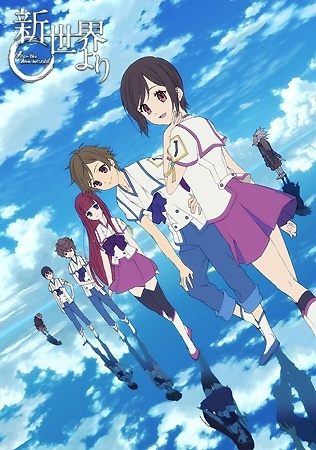
So first things first: I want you to take a good look at the above picture. If you’ve come across Shin Sekai Yori while browsing through streaming sites or anime blogs, chances are this is the picture you saw. It graces the show’s MAL and ANN pages, and a Google image search of the show’s title pops up various versions of it. I want you to study it closely because this could be one of the most misleading pictures in the history of visual communication. This show is very dark, highly intelligent and has only the most tenuous of links to the school genre. It’s a story about right and wrong, and what you do when only the wrong thing can ensure your survival. What price are humans willing to pay to save themselves from the most horrifically dangerous enemy imaginable – each other? In a way the above picture is appropriate because it gives you a sense of the reality on the surface, but it doesn’t clue you in on the true depth and sobering complexity it contains, which is what initially made me hesitant to watch it.
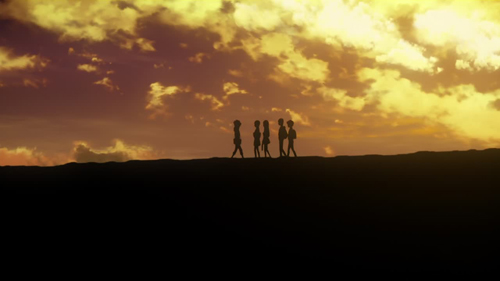
This brings me to my next point: Moral ambiguity. I often say I like moral ambiguity because life is never that clear cut. Lord of the Rings, for all its brilliance, doesn’t exactly have to work hard to get you to like the heroes and hate the villains, because they each conform to hero/villain archetypes. But if you go too far into moral ambiguity, you often get something that doesn’t inspire too much passion in people and could easily come across as preachy. If the hero and the villain are equally good or bad, then what difference does it make which of them wins in the end? I felt that this was one of the biggest failings of Code Geass, for example – it didn’t stay true to its own moral code and by the end good and bad became so muddled it almost stopped mattering.
SSY, on the other hand, uses moral ambiguity very well, and really digs deep into the dynamics of a utopian/dystopian society. This seemingly harmonious future has many dark undercurrents, and one person’s evil is another’s dire necessity depending on their perspective. The show takes you through several of these perspectives as the characters grow and learn more about themselves and their world, and with them, you experience what happens when their childhood notions of good and evil are challenged and forced to evolve. There certainly are heroes and villains here (it just takes a while to sort them out from one another), but no action feels like it is entirely unmerited or simply carried out because the character is "a good guy" or "a villain." Everyone is doing what they think is best, and no one is particularly wrong in wanting what they want either (for the most part). And yet, SSY manages to do this without feeling preachy (and I am very sensitive to movies or shows that try to force feed me a world view; perhaps even too sensitive), which I consider quite an accomplishment. It reminded me a bit of the biblical story of The Poor Man’s Ewe. If you don’t know what I’m talking about, watch the show first and then look it up. In fact, it almost pulls a double Poor Man’s Ewe. I hope this comparison is not lost on everyone because I think SSY accomplishes something rather clever by the end in terms of the message it sends the viewer.
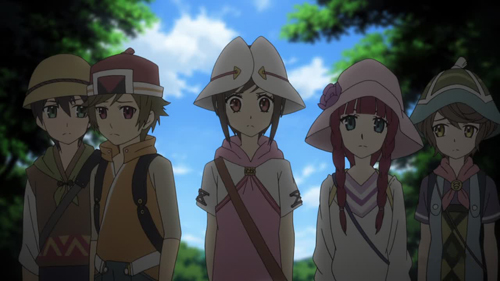
The world-building here is also stellar. One of the only things I knew about this show before watching it is that it took place 1,000 years in the future. I really like the future history that they built, and many things that may initially strike you as making no sense are there for a reason, and are also questioned by the characters themselves. What I mean is that our protagonists don’t blindly accept the conventional wisdom of their own society once it starts to clash with reality, so almost nothing is taken for granted as being true simply to move the story forward. There is also a lot of nice embellishment and detail such as the style of dress and their societal attitude towards things like sex, which came across feeling entirely like it promoted the story and fleshed out the world, and not at all like titillation or fanservice. It’s actually one of the better handlings of sexual contact that I’ve seen in anime, especially of the homosexual variety, and it really enhances the feeling of a close bond between the characters. It also gives the real sense that these people are products of a future society that is distinctly different from ours as opposed to just being humans from our time who are transplanted into a future setting, as often happens in stories set in different eras or worlds.
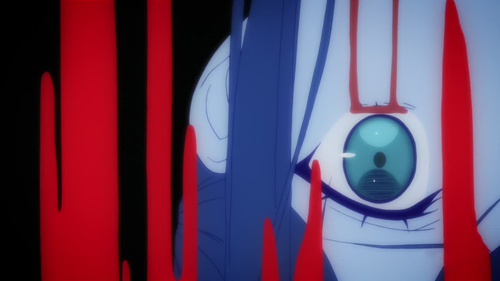
The pacing and directing are also terrific. I like that there was no proper OP and no set episode structure. It felt like each episode introduced the title card and episode name in a place that fit and worked for the story, which gave it more artistic heft. It is also made up of mini arcs, but they transition very well and are all tightly related to each other, so if you aren’t paying attention you could easily miss the transitions (a couple are unmistakable for reasons I will not mention). The art and animation are very nice, with good use of various colored character outlines and subjective use of color schemes, as well as unorthodox blocking and angles, and some powerful visual enhancements of moments with an emotional impact. It’s definitely one of those shows that you recognize almost instantly.
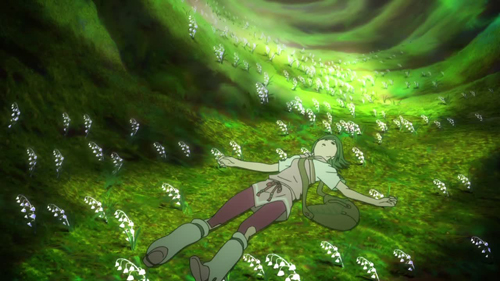
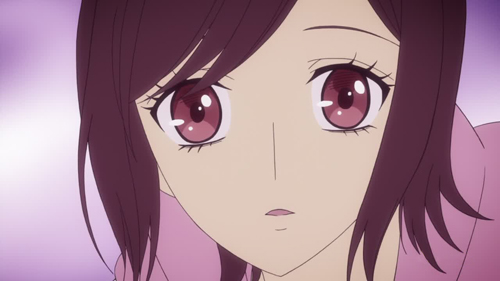
The seiyuu cast was great; even Yuuki Kaji, whom people just love to hate. Aya Endou delivers one hell of a performance as Saki. Hana Kanazawa as Maria wasn’t as good here as she was playing Aika in Zetsuen no Tempest (possibly her best role to date that I’ve seen), but she always shines in these types of roles. I will also commend the soundtrack, which has some great tracks that I loved hearing over and over again. The main vocal theme especially will forever bring me back to this world. It’s very distinct and always sets the scene throughout the show.
I feel like if I keep going at this point I’ll just start spoiling things. I’m making a very serious effort to be as vague as possible but still explain what it is about this show that appealed to me so much. Overall, I can’t really think of many bad things to say about Shin Sekai Yori, aside perhaps for a few parts that were initially a bit vague and took a while to catch on to, and also one particular line of dialogue early on that clues you in on what will happen later. Sometimes I love it when that happens, but in this case I think the show could have done without it; very minor gripes in the overall scheme of things. The best thing I can say about SSY is that it really felt like the story was paramount. The various stylistic and narrative choices and the different elements they used all felt like they were there to give you a very complete experience, and it all worked extremely well. I highly recommend you check it out. I initially scored this show 9/10, but upon second thought, I couldn’t think of a single reason that I wasn’t scoring it a 10 other than my desire to not simply give perfect marks for every really good show. I don’t think that’s a good enough reason, though, and it would be unfair to such a remarkably cohesive product. So screw being too cool for the room – I give it a 10.
